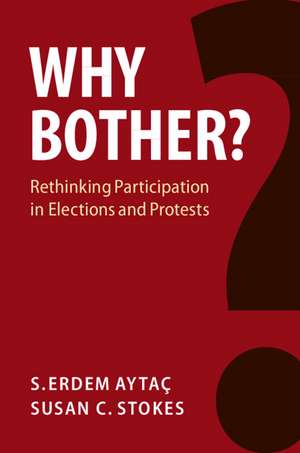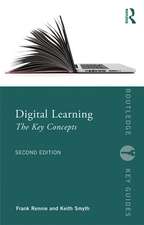Why Bother?: Rethinking Participation in Elections and Protests: Cambridge Studies in Comparative Politics
Autor S. Erdem Aytaç, Susan C. Stokesen Limba Engleză Paperback – 9 ian 2019
| Toate formatele și edițiile | Preț | Express |
|---|---|---|
| Paperback (1) | 197.73 lei 6-8 săpt. | |
| Cambridge University Press – 9 ian 2019 | 197.73 lei 6-8 săpt. | |
| Hardback (1) | 638.00 lei 6-8 săpt. | |
| Cambridge University Press – 9 ian 2019 | 638.00 lei 6-8 săpt. |
Din seria Cambridge Studies in Comparative Politics
-
 Preț: 179.15 lei
Preț: 179.15 lei -
 Preț: 267.61 lei
Preț: 267.61 lei -
 Preț: 239.36 lei
Preț: 239.36 lei - 9%
 Preț: 594.67 lei
Preț: 594.67 lei -
 Preț: 160.82 lei
Preț: 160.82 lei -
 Preț: 269.58 lei
Preț: 269.58 lei -
 Preț: 264.74 lei
Preț: 264.74 lei -
 Preț: 177.28 lei
Preț: 177.28 lei -
 Preț: 225.70 lei
Preț: 225.70 lei -
 Preț: 164.94 lei
Preț: 164.94 lei -
 Preț: 236.42 lei
Preț: 236.42 lei -
 Preț: 185.64 lei
Preț: 185.64 lei -
 Preț: 233.13 lei
Preț: 233.13 lei -
 Preț: 206.71 lei
Preț: 206.71 lei -
 Preț: 231.82 lei
Preț: 231.82 lei -
 Preț: 206.52 lei
Preț: 206.52 lei -
 Preț: 201.24 lei
Preț: 201.24 lei -
 Preț: 358.37 lei
Preț: 358.37 lei -
 Preț: 203.42 lei
Preț: 203.42 lei -
 Preț: 232.45 lei
Preț: 232.45 lei -
 Preț: 257.82 lei
Preț: 257.82 lei -
 Preț: 191.12 lei
Preț: 191.12 lei -
 Preț: 158.77 lei
Preț: 158.77 lei -
 Preț: 199.05 lei
Preț: 199.05 lei - 11%
 Preț: 553.80 lei
Preț: 553.80 lei - 11%
 Preț: 695.06 lei
Preț: 695.06 lei -
 Preț: 288.80 lei
Preț: 288.80 lei -
 Preț: 262.06 lei
Preț: 262.06 lei - 11%
 Preț: 691.66 lei
Preț: 691.66 lei -
 Preț: 388.29 lei
Preț: 388.29 lei -
 Preț: 288.04 lei
Preț: 288.04 lei -
 Preț: 228.00 lei
Preț: 228.00 lei -
 Preț: 385.28 lei
Preț: 385.28 lei -
 Preț: 312.89 lei
Preț: 312.89 lei -
 Preț: 224.44 lei
Preț: 224.44 lei -
 Preț: 287.07 lei
Preț: 287.07 lei -
 Preț: 251.27 lei
Preț: 251.27 lei -
 Preț: 313.70 lei
Preț: 313.70 lei -
 Preț: 277.38 lei
Preț: 277.38 lei -
 Preț: 423.79 lei
Preț: 423.79 lei - 11%
 Preț: 552.94 lei
Preț: 552.94 lei - 11%
 Preț: 554.43 lei
Preț: 554.43 lei - 14%
 Preț: 783.26 lei
Preț: 783.26 lei
Preț: 197.73 lei
Nou
37.84€ • 39.60$ • 31.49£
Carte tipărită la comandă
Livrare economică 31 martie-14 aprilie
Specificații
ISBN-10: 1108465943
Pagini: 172
Ilustrații: 12 b/w illus. 28 tables 6 exercises
Dimensiuni: 152 x 228 x 10 mm
Greutate: 0.23 kg
Editura: Cambridge University Press
Colecția Cambridge University Press
Seria Cambridge Studies in Comparative Politics
Locul publicării:New York, United States
Cuprins
Recenzii
'This beautifully written book offers a simple theory to explain popular behavior in elections and protests. Aytaç and Stokes ask why people are sometimes not dissuaded from participation even when it becomes more difficult or dangerous. Why Bother? gives us hope that there are critical brakes on democratic backsliding. It comes at just the right moment.' Nicholas Valentino, University of Michigan
'It would be hard to overstate the importance of understanding the causal dynamics of political participation. And yet, despite massive social science investment in the topic, conventional theories in political science, sociology, and economics fail to explain empirical variation in participation. That's what makes Why Bother? so important. By taking seriously competing perspectives from different disciplines and attending to a range of real world cases, the authors have fashioned a compelling new theory of participation that promises to revolutionize our understanding of this most important political phenomenon.' Doug McAdam, Ray Lyman Wilbur Professor of Sociology, Stanford University, California
'The theoretical framework developed in this book gives students of political participation new tools to think about how these macrolevel factors influence individual decisions to vote and join protests … This book will undoubtedly become a classic in the political participation literature.' Miguel Carreras, Perspectives on Politics
Descriere
Why do vote-suppression efforts sometimes fail? Why does police repression of demonstrators sometimes turn localized protests into massive, national movements? How do politicians and activists manipulate people's emotions to get them involved? The authors of Why Bother? offer a new theory of why people take part in collective action in politics, and test it in the contexts of voting and protesting. They develop the idea that just as there are costs of participation in politics, there are also costs of abstention - intrinsic and psychological but no less real. That abstention can be psychically costly helps explain real-world patterns that are anomalies for existing theories, such as that sometimes increases in costs of participation are followed by more participation, not less. The book draws on a wealth of survey data, interviews, and experimental results from a range of countries, including the United States, Britain, Brazil, Sweden, and Turkey.











